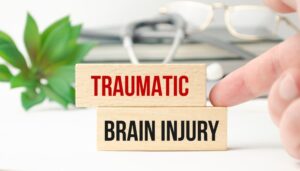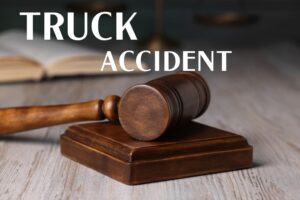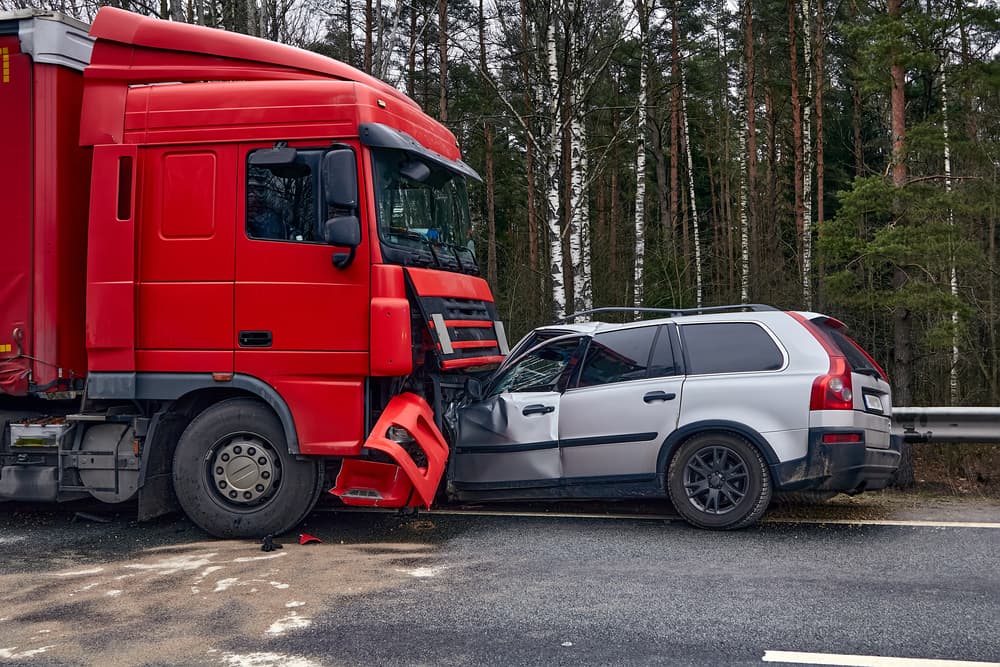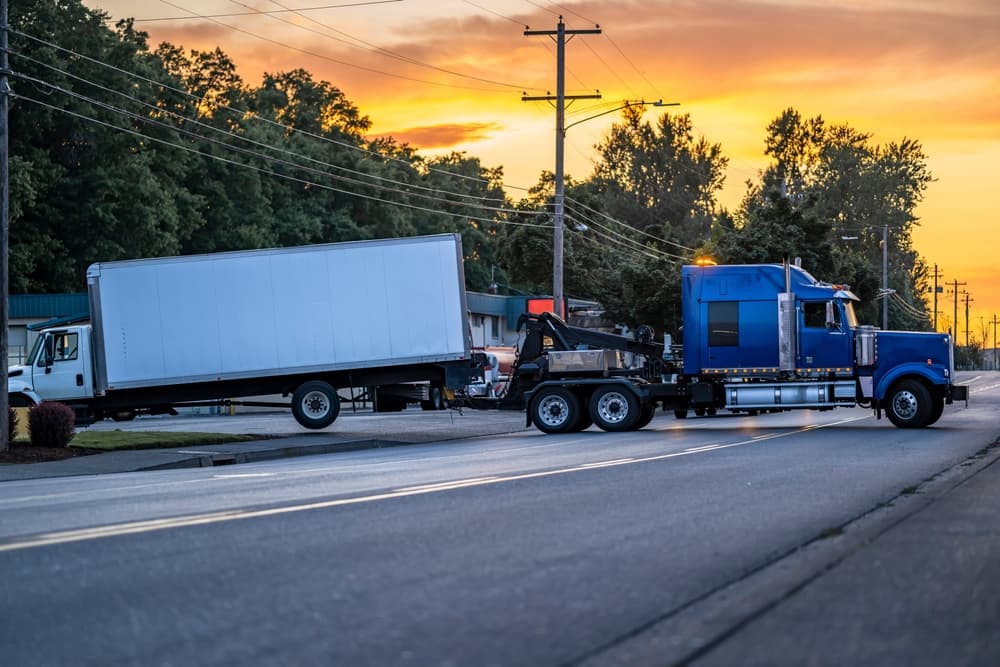Jackknife truck accidents are among the most dangerous collisions involving large commercial vehicles. These accidents occur when the trailer of a semi-truck swings out to form an angle with the cab, resembling the shape of a partially opened pocket knife.
The following is a look at the causes and injuries associated with jackknife truck accidents and why hiring a truck accident lawyer is essential to protect your rights after such an event.
How Jackknife Accidents Happen
Jackknife accidents don’t occur randomly. They often stem from a combination of mechanical failures, road conditions, driver behavior, and external factors. Below are some of the primary causes that lead to these dangerous events.
Sudden Braking on Slippery Roads
One of the most common scenarios leading to a jackknife accident involves sudden braking on slippery surfaces. Wet, icy, or loose gravel roads can reduce traction, making it difficult for the trailer to maintain its alignment with the cab. When a truck driver applies the brakes abruptly in these conditions, the trailer wheels may lock up, causing it to swing uncontrollably.
Rain and snow are frequent culprits, but even less obvious hazards like a thin layer of gravel or oil spills on the road can trigger a jackknife. Drivers facing emergency braking situations in such conditions often have little control over the vehicle’s stability, especially if they’re traveling at high speeds or carrying heavy loads.
Inadequate Maintenance of Braking Systems
The braking system on a commercial truck is its first line of defense against accidents. However, these systems require regular inspection and maintenance to function properly. Uneven brake wear, failure to replace aging components, or improper adjustments can all compromise the truck’s braking performance.
A braking imbalance, where certain wheels exert more or less stopping force than others, is particularly problematic. This imbalance can destabilize the trailer during braking, increasing the risk of jackknifing. Outright brake failure can leave the driver with no way to control the vehicle, especially in emergencies. Poor maintenance practices by trucking companies or independent operators often play a significant role in these accidents.
Driver Fatigue and Reaction Times
Long-haul trucking is physically and mentally exhausting, and fatigue remains a persistent problem in the industry. Despite federal regulations limiting the number of hours a truck driver can work in a single shift, violations of these rules aren’t uncommon. Fatigue affects a driver’s ability to make quick, sound decisions, increasing the likelihood of errors like oversteering, underestimating stopping distances, or braking too suddenly.
When drivers are drowsy, their reaction times slow, and their ability to assess road conditions deteriorates. A split-second delay in judgment can turn a manageable situation into a catastrophic jackknife accident, especially when compounded by other factors like bad weather or mechanical issues.
Improperly Loaded Cargo
The cargo distribution inside a trailer is crucial to a truck’s stability. Improperly loaded cargo creates an unbalanced center of gravity, making the trailer more prone to swaying or tipping. This imbalance is especially dangerous during sharp turns, sudden stops, or evasive maneuvers, as it can amplify the trailer’s instability.
Poorly secured cargo that shifts during transit adds another layer of risk. A sudden weight shift can destabilize the trailer, leading to loss of control and increasing the likelihood of jackknifing. Proper loading techniques and securement methods are essential to prevent these accidents, but lapses in oversight can lead to disastrous consequences.
Failure to Adjust to Road Curves
Sharp curves and steep declines demand precise speed and steering control. Drivers who approach these road features too quickly or fail to adjust their speed risk losing control of their trailers.
Road conditions also play a significant role. Slippery surfaces, potholes, or poorly maintained roads can reduce traction, making it harder for the trailer to follow the cab’s path. When a driver misjudges the approach to a curve, the trailer can swing out, leading to a jackknife. Proper training and adherence to safe driving practices are critical in navigating these challenges.
Mechanical Defects Beyond Brakes
While brake failures are a leading cause of jackknife accidents, other mechanical defects can also contribute to these incidents. Faulty steering systems, worn-out tires, and suspension failures are all potential culprits. These issues can limit a driver’s ability to maintain control, particularly during emergency maneuvers.
For instance, worn tires may lack the necessary tread to grip the road, especially in wet or icy conditions. Faulty steering can prevent the driver from making the necessary adjustments to keep the trailer aligned. Suspension problems can further destabilize the truck, particularly when carrying heavy or unevenly distributed loads. These mechanical issues often result from neglected inspections and repairs, highlighting the importance of regular maintenance in preventing accidents.
Common Injuries from Jackknife Truck Accidents
The injuries resulting from a jackknife accident can be severe due to the sheer size and weight of commercial trucks. For victims in smaller vehicles, the consequences can be life-altering or even fatal. These are some of the injuries that typically result from jackknife truck accidents.
Traumatic Brain Injuries (TBIs)

Head trauma is a frequent outcome of jackknife truck accidents. The impact can cause your head to hit the steering wheel, dashboard, or window, leading to concussions or more severe brain injuries. Symptoms may include headaches, memory loss, and difficulty concentrating, with some cases requiring long-term medical care.
Spinal Cord Injuries
The force of a collision can easily damage your spinal cord, leading to herniated discs, fractured vertebrae, or even paralysis. Spinal cord injuries often result in chronic pain, reduced mobility, and significant changes to your quality of life.
Internal Organ Damage
Internal injuries are another serious concern. The impact of a collision can rupture organs like the liver, spleen, or kidneys. These injuries may not be immediately apparent, making prompt medical evaluation essential after a jackknife accident.
Soft Tissue Injuries
Whiplash and other soft tissue injuries often occur due to the sudden force of impact. These injuries can result in lingering pain, stiffness, and reduced range of motion, affecting your ability to work and carry out daily activities.
Psychological Trauma
Beyond physical injuries, the psychological impact of a jackknife accident shouldn’t be overlooked. Post-traumatic stress disorder (PTSD), anxiety, and depression are common among survivors. These emotional injuries can be just as debilitating as physical ones and often require therapy or counseling to overcome.
How a Truck Accident Lawyer Will Help You Seek Compensation

After a jackknife truck accident, medical expenses, lost income, and emotional trauma are just some of the challenges you may face. A truck accident lawyer can provide essential support in helping you recover compensation for your losses. Whether through settlement negotiations or courtroom litigation, an attorney can guide you through the process and protect your rights.
Investigating the Cause of the Accident
Determining what caused the jackknife accident is the foundation of a strong legal case. Identifying the root cause requires a thorough investigation, which your attorney can handle on your behalf. This process often involves gathering and analyzing various types of evidence, such as:
- Maintenance records: These documents can reveal whether the truck’s brakes or other critical systems were properly inspected and repaired.
- Driver logs: Federal regulations require truck drivers to maintain logs of their hours behind the wheel. These logs can help determine if driver fatigue contributed to the accident.
- Witness statements: Accounts from individuals who saw the accident can provide valuable insights into what happened and who was at fault.
Your attorney may work with accident reconstruction professionals to recreate the events leading to the crash. This type of analysis can clarify how and why the truck jackknifed, supporting your compensation claim.
Holding Negligent Parties Accountable
Jackknife accidents often involve multiple parties, and determining who is responsible can be complicated. Liability may fall on the truck driver, the trucking company, maintenance personnel, or cargo loaders. For example:
- A driver may have acted recklessly by speeding or braking too suddenly.
- A trucking company might need to enforce proper maintenance or driver training protocols.
- A maintenance crew could have neglected essential repairs.
- Cargo loaders may have improperly secured or distributed the truck’s load, causing instability.
Your truck accident lawyer will work to identify all negligent parties and ensure they are held accountable for their actions. This approach increases the likelihood of recovering full compensation for your injuries and losses, as multiple parties may contribute to a settlement or judgment.
Negotiating with Insurance Companies
Dealing with insurance companies can be one of the most frustrating aspects of recovering after a jackknife accident. Insurers often aim to minimize payouts or shift blame to reduce their liability. Adjusters may attempt to downplay the severity of your injuries or argue that you were partially responsible for the crash.
An attorney can handle all communication with the insurance companies, ensuring your interests are represented effectively. They will review settlement offers, counter unfair proposals, and advocate for a resolution that accurately reflects the extent of your damages. By managing these negotiations, your truck accident lawyer helps you focus on your recovery instead of the stressful back-and-forth with insurers.
Pursuing Damages in Court
While many cases are resolved through settlements, some disputes require litigation to achieve a fair outcome. If settlement negotiations fail, your attorney can represent you in court. They will:
- Present evidence supporting your claim, such as maintenance records or driver logs.
- Question witnesses, including experts who can explain the technical aspects of the accident.
- Make compelling arguments to demonstrate liability and the extent of your damages.
Although court proceedings can be intimidating, having an attorney by your side ensures that your case is handled professionally and your voice is heard. This support can make a significant difference in the outcome of your case.
Common Challenges in Jackknife Accident Cases

Jackknife accident claims often involve complex legal and factual issues, making them more challenging than other motor vehicle accident cases. Victims face hurdles such as disputes over liability, difficulty proving long-term injuries, and bias from trucking companies or insurers. Here’s a look at some of these challenges and how a truck accident lawyer can address them.
Disputes Over Liability
Assigning fault in a jackknife truck accident is more complex. Multiple parties may share responsibility, including the truck driver, trucking company, vehicle manufacturer, and even third-party maintenance crews. Each party has its own interests and legal teams, often working to shift blame elsewhere.
For example, a trucking company might claim that a mechanical defect caused the accident and direct the fault toward the manufacturer. Meanwhile, the truck driver might argue that poor road conditions or an unexpected hazard made the accident unavoidable. These overlapping claims can complicate the process of determining who should be held accountable for your damages.
Your truck accident lawyer can address these disputes by gathering and analyzing evidence to establish fault. Maintenance records, driver logs, and black box data from the truck can be critical in demonstrating what caused the accident. By identifying the liable parties, your attorney ensures those responsible are held accountable for their actions or negligence.
Proving Long-Term Injuries
Injuries resulting from jackknife accidents often have long-term consequences, but proving the extent of these injuries can be a challenge. Conditions such as spinal cord damage, traumatic brain injuries, and post-traumatic stress disorder (PTSD) may not fully manifest until weeks or months after the accident. Insurers often exploit this by downplaying the severity of your injuries or arguing that they are unrelated to the crash.
Your attorney can work with medical experts to document the full extent of your injuries and their future impact on your life. This may involve obtaining detailed medical evaluations, securing expert testimony, and presenting evidence of how your injuries affect your ability to work and carry out daily activities. By clearly demonstrating the long-term implications of your injuries, your attorney can help ensure you receive compensation that reflects the true extent of your losses.
Focus on Your Recovery. Let a Truck Accident Lawyer Focus on the Legal Issues
By working with a personal injury lawyer, you can pursue the compensation you need to rebuild your life and move forward after such a traumatic experience. Schedule a free consultation with an attorney as soon as possible.


